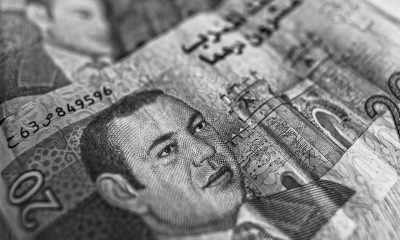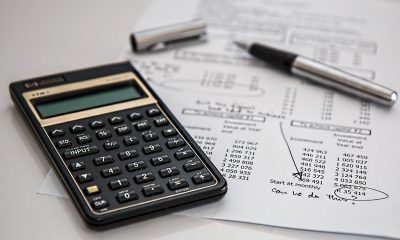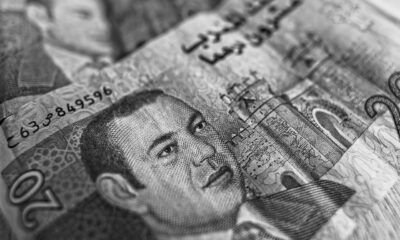Africa
Morocco’s budget deficit is in line with the forecasts
The implementation of the Amending Finance Law at the end of December 2020 revealed a budget deficit of $9.2 million (82.4 MMDH), representing 7.6% of GDP. This result is in line with last July’s forecasts which expected a deficit of 7.5%. With regard to capital expenditure, the implementation of the LFR was characterized by a sustained effort.

The Ministry of Economy, Finance and Administrative Reform has just released the Situation of the Treasury’s Expenses and Resources (SCRT) for the year 2020. This document on the implementation of the Amending Finance Law (LFR), adopted last July, shows a budget deficit of $9.2 million (82.4 MMDH), representing 7.6% of GDP. This result is in line with the forecasts which expected a deficit of 7.5% instead of 3.5% in the LF 2020.
Read more about Morocco’s budget deficit and find other economic news with our companion app Born2Invest.
Decrease of 1.8% in ordinary revenues
At the revenue level, 2020 resulted in a decrease in ordinary revenue of 1.8% from the decrease in direct taxes of 3.9%, customs duties of 2.2%, indirect taxes of 7% and registration and stamp duties of 11.4%, combined with an increase in non-tax revenue of 21.9%. Indeed, non-tax revenues recorded capital losses in innovative financing -$1.28 million (-11.5 MMDH) and revenues and proceeds from asset disposals from public institutions and companies -$550,000 (-5 MMDH). Capital losses that were only partially offset by the improvement of “assistance and grant funds”$624,000 (+5.6 MMDH) and “miscellaneous income” $480,000 (+4.3 MMDH).
Thus, had it not been for the good revenues recorded in tax revenues, which generated a capital gain of $1.45 million (13 MMDH), these capital losses recorded in non-tax revenues could not have been offset and would have led to a more severe budget deficit. In fact, this capital gain occurred despite the State’s continued efforts to reimburse VAT credits, which reached $1.16 million (10.4 MMDH) at the end of 2020 against $1.1 million (9.8 MMDH) one year earlier. The prize goes largely to the recovery of VAT, which recorded a 113.7% implementation rate. The level of advance payments and regularization supplements paid in 2020 was not affected by the crisis, thus recording total revenues of $4.2 million (37.6 MMDH) at the end of 2020, against $4.12 million (36.9 MMDH) one year earlier.
“Admittedly, the SI is largely related to the 2019 results, but even the other taxes, whose return is correlated to the 2020 activity, have shown some resilience,” explained the Ministry.
For example, after a sharp drop during the period of containment (March-May 2020), tax revenues began to show a stronger than expected recovery from June onwards, as containment was eased. IR revenues thus showed a rate of achievement in line with the LFR forecast of 100.3%. Inland VAT revenue also showed a realization rate of 114.4%, representing a capital gain of $300,000 (2.7 MMDH), while registration and stamp duties showed a realization rate of 104.7%.
“This good performance of tax revenues has been helped by the effect of the spontaneous regularization of the tax situation of taxpayers, subject of the measure introduced by the LF 2020 and whose impact, estimated at nearly $334,000 (3 MMDH), was felt mainly in December,” the ministry stressed.
Revenue from customs duties and VAT on imports also increased compared to the LFR forecasts, with a realization rate of 119.6% and 110.2% respectively, in relation to the increase in imports of 10.8%, including 36.4% for energy products. Domestic consumption taxes (TIC) were slightly lower than forecast (99.2%), mainly due to the decline in TIC on energy products as a result of the 12.8% drop in fuel consumption.
7.4% increase in expenses
As regards expenditure, this increased by 7.4% in 2020, resulting from the increase in expenditure on goods and services by 5.7% due to the increase in personnel expenditure by 4.5% and other goods and services by 8.2%, and the increase in tax refunds, rebates and restitutions by 5.2% and capital expenditure by 27.4%, combined with the decrease in debt charges and interest and compensation issues by 35.7%. “This being said, despite the increase in compensation charges, ordinary expenses were contained at $25.9 million (231.9 MMDH), thus achieving an execution rate of 97.7% compared to the LFR 2020 forecasts, thanks to savings made in goods and services and debt interest,” the ministry revealed.
The cost of compensation has indeed been $189,000 (1.7 MMDH) higher than forecast, mainly due to the increase in butane gas prices to an average of $380 per ton against a forecast of $290 per ton. Expenditure on goods and services, on the other hand, showed a saving of $690,000 (6.2 MMDH); in the same vein, net interest on debt recorded a saving of nearly $122,000 (1.1 MMDH). These changes in ordinary income and expenditure made it possible to reduce the ordinary balance to nearly -$312,000 (-2.8 MMDH), compared to a forecast of -$1.67 million (-15 MMDH).
With regard to capital expenditure, the implementation of the LFR was characterized by a sustained effort. Indeed, investments reached $9.58 million (85.9 MMDH), corresponding to a realization rate of 121.3%, up by $1.51 million 13.6 MMDH (+18.8%) compared to 2019. This amount covers, in addition to the traditional investments of the State, the allocation of $1.67 million (15 MMDH) planned for the Strategic Investment Fund that all operators expect for the recovery of the economy.
__
(Featured image by Lukas Blazek via Unsplash)
DISCLAIMER: This article was written by a third party contributor and does not reflect the opinion of Born2Invest, its management, staff or its associates. Please review our disclaimer for more information.
This article may include forward-looking statements. These forward-looking statements generally are identified by the words “believe,” “project,” “estimate,” “become,” “plan,” “will,” and similar expressions. These forward-looking statements involve known and unknown risks as well as uncertainties, including those discussed in the following cautionary statements and elsewhere in this article and on this site. Although the Company may believe that its expectations are based on reasonable assumptions, the actual results that the Company may achieve may differ materially from any forward-looking statements, which reflect the opinions of the management of the Company only as of the date hereof. Additionally, please make sure to read these important disclosures.
First published in LesEco.ma, a third-party contributor translated and adapted the article from the original. In case of discrepancy, the original will prevail.
Although we made reasonable efforts to provide accurate translations, some parts may be incorrect. Born2Invest assumes no responsibility for errors, omissions or ambiguities in the translations provided on this website. Any person or entity relying on translated content does so at their own risk. Born2Invest is not responsible for losses caused by such reliance on the accuracy or reliability of translated information. If you wish to report an error or inaccuracy in the translation, we encourage you to contact us.

-

 Impact Investing2 weeks ago
Impact Investing2 weeks agoEnfinity Launches First Solar Plant in Italy with Microsoft
-

 Crypto7 hours ago
Crypto7 hours agoBitcoin Wavers Below $70K as Crypto Market Struggles for Momentum
-

 Markets1 week ago
Markets1 week agoSilver Dips Sharply, While Gold Gains Amid Mixed Stock Market
-

 Crowdfunding2 weeks ago
Crowdfunding2 weeks agoEvenFi Launches Run-Off Service to Protect Investors as Crowdfunding Platforms Exit
























